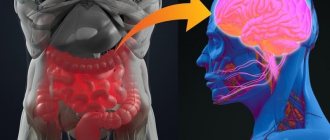Laughter expresses our emotions and conveys them to others through facial expressions and characteristic sounds. Its main function is to convey joy, tell others that a person is feeling good, and invite them to share a good mood.
Laughter allows you to establish contact with your interlocutor or audience. It can also have a schadenfreude nature, as when people laugh together at a common enemy. Laughter, multiplied by intelligence and emotions, is a powerful weapon, a demonstration of the ability to resist evil. Gogol also wrote: “Even those who are no longer afraid of anything are afraid of ridicule.” So where did laughter come from?
Why should we laugh
It is clear that life without humor becomes gloomy and contributes to stress, and stress can cause almost any disease. But most of us don’t even realize that the phrase about the healing properties of laughter has very real scientific evidence. Recently, scientists are increasingly finding evidence that people whose lives lack healthy humor are more likely than cheerful people to suffer from chronic diseases.
Content:
- Why should we laugh
- What happens to the body when we laugh
- How does laughter affect a person?
- What is laughter therapy
Scientists believe that laughter, especially spontaneous laughter, can not only improve mood, but also prevent a variety of ailments. In addition, during laughter, the body produces substances that create an analgesic effect.
Sincere laughter restores a positive emotional state and also helps to establish a connection between people. Some researchers even believe that the main function of laughter is to bring people together.
Where are the brain centers responsible for laughter?
The neurophysiological centers responsible for laughter are located in the “ancient” areas of the cerebral cortex, found in many animals. This leads scientists to believe that the ability to laugh is not entirely unique to humans - animals, in their opinion, have similar ways of expressing fun.
About ten years ago, Professor Jack Panksepp published an article in the journal Science in which he argued that many animals also know how to laugh. According to the professor, they simply laugh slightly differently than humans. Monkeys and dogs make puffing sounds, and rats squeak, and at very high tones - up to a frequency of 50 kilohertz. Scientists from Washington State University in the USA previously confirmed the sense of humor in rats.
What happens to the body when we laugh
Each of us knows the saying that laughter is health. But few people understand how much truth is contained in these words. French neurologist Henri Rubinstein studied laughter for many years. In 2003, he wrote the book “Psychosomatics of Laughter,” where he described in detail its influence on physiological and psychological processes in the body.
Laughter affects many organs of our body, improving their functioning. Take, for example, the respiratory system. When we start laughing, instead of the usual 1 liter of air, we inhale about one and a half. Why is this good? The fact that the body is saturated with oxygen stronger and faster.
During laughter, breathing and heart rate increase and blood pressure temporarily increases. Thanks to this effect, blood circulates faster through the vessels and the body is also quickly enriched with oxygen.
When we laugh, we activate the ribs and abdominal muscles, which in turn improves blood flow from the abdominal cavity towards the heart.
When a person smiles, the facial muscles are activated. And this is an excellent prevention of sagging skin and wrinkles.
In addition, while having fun, the body increases the production of endorphins, otherwise known as happiness hormones. These substances have been proven to help relieve toothache, headaches and muscle pain.
Laughter relaxes the body, relieving tension and stress. Scientists have discovered that after a sincere laugh, the body remains in a state of relaxation for another 45 minutes.
In addition, laughter can be considered as a mild and rather specific form of physical activity. This is a kind of workout for the muscles of the face, chest, shoulders, abdomen and diaphragm. It turns out that 10 minutes of moderate intensity laughter can burn about 50 kcal. That is why it is sometimes called “inner running.”
Children's
Children's laughter falls into a special category. This is the spiritual impulse of a child, pure, flowing and bringing delight and joy to everyone around him. From a scientific point of view, its causes can be any pleasant and unexpected sounds, funny facial expressions, tactile sensations (tickling). Young children do not know how to read and perceive humor in the form in which it evokes positive emotions in adults.
Moreover, experts note that regardless of the circumstances and environment, children's laughter is the same. This is an open expression of joy. It occurs unconsciously and lasts as long as the external influence continues. Thus, children's laughter is momentary and is not repeated as a memory of the situation.
How does laughter affect a person?
Most of us feel much better after laughing. Why does this happen and how can a cheerful mood affect the functioning of different systems and organs of the human body?
Increases pain threshold
Research shows that laughter helps improve the well-being of people who experience constant pain, such as that caused by chronic illness. The results of scientific observations allowed experts to conclude that the manifestation of joy reduces pain and makes it easier to endure discomfort. Scientists explain this fact by the phenomenon of distraction. Simply put, the person laughing is focused on a different type of sensation, forgetting that something is causing him pain. But there is another theory that explains the relationship between pain and laughter, based on the role of endorphins. The so-called happiness hormones act as a natural pain reliever, causing a state of mild euphoria.
Protects the heart
Laughter improves the functioning of the cardiovascular system and is a good prevention of heart attacks and other cardiac problems. Experts have found that laughter has an anti-inflammatory effect and also protects blood vessels and heart muscle, thereby preventing the development of cardiac disorders. The mechanism of the protective function of laughter for the cardiovascular system has not yet been sufficiently studied, but researchers suggest that the beneficial effect is achieved by reducing the body's susceptibility to stress.
Improves brain function
There is evidence that joy and laughter improve brain function. In particular, the brains of laughing people release a protein substance known scientifically as neurotrophic factor, which stimulates the growth of new neurons and improves communication between them.
While studying the nature of laughter, scientists also found that different types of this emotion activate different parts of the brain. Thus, benevolent humor and caustic ridicule activate completely different parts of the brain. In other words, any kind of laughter is always a “warm-up” for the brain.
Strengthens immunity
Some scientific studies suggest that laughter increases the body's resistance to infections. To prove this theory, scientists conducted an experiment with the participation of two groups of volunteers. Some were offered to watch a comedy, others - a drama film. After the film show, it turned out that in the body of those who watched the comedy, the number of antibodies responsible for resisting respiratory infections increased.
The theory of the influence of positive emotions on immunity was confirmed by the results of other scientific experiments. This time, scientists found confirmation that 60 minutes of sincere laughter help improve the functioning of the immune system over the next 12 hours.
Normalizes sugar levels
During laughter, the amount of sugar in the blood decreases and glucose tolerance increases, which is very useful for people with diabetes. On the contrary, negative emotions such as anger and sadness lead to increased blood glucose. Scientists explain the beneficial effect of laughter on blood sugar levels in diabetics by enhancing muscle function and affecting the endocrine system.
Relieves stress
Stress is called the main scourge of our time. But scientists have found a way to effectively, and most importantly, pleasantly deal with the consequences of stressful situations. Experts advise just laughing. Humor helps create a positive mood and is an excellent antidote to stressful situations. And all because when you laugh, your body stops producing stress hormones.
Increases stress resistance
Stress-resistant people perceive any failure not as a personal defeat, but as one of the stages on the path to success. Stress resistance makes a person more successful and happy. Laughter helps develop this quality. The ability to admit one’s own mistakes without getting upset and the ability to laugh at oneself help a person to cope with stressful situations more easily.
Acts as a natural antidepressant
Humor is the best way to get out of depression. This emotion affects the human body in exactly the same way as antidepressants. Laughter activates the release of serotonin (also known as the happiness hormone). But so far, scientists cannot say with certainty how long the antidepressant effect of laughter on the brain lasts.
By the way, not only sincere, but also forced laughter (when a person smiles without much desire) will help overcome depression. It turns out that even such “forced” laughter contributes to the release of neuropeptides and dopamine, which also lead to improved mood.
In addition, during laughter, endorphins are produced in the body. These are natural morphine-like compounds that increase the pain threshold, cause sedation and a feeling of mild euphoria. And this explains why people usually feel better after laughing.
Improves mental health
Laughter helps a person feel good, but what is important is that this feeling persists for quite a long time even after the laughter subsides. Humor helps maintain optimism in difficult life situations. This is more than just a release from sadness and pain. It helps you find the strength and courage to face life's difficulties. In the most difficult times, even a forced smile can help improve your mood.
A person is simply not able to feel anxiety, anger or sadness when he laughs. Laughter generates energy and improves concentration. And not so long ago, researchers discovered another very interesting fact. It turns out that through the prism of laughter a person can look at a problem in a more realistic light. This is why many psychologists advise laughing at a problem, after which it will not seem so scary and insoluble. And of course, friendly humor helps resolve conflict situations and prepares the interlocutor for more friendly communication.
What caused laughter in ancient times and what causes laughter now
Moreover, the funny thing is that until recently there was no humor at all. There was everything - laughter, fun, fun and nursery rhymes, irony and sarcasm. We always had fun. There was no humor. Gorilla Koko, who was taught sign language, learned to play with meanings - put a folder on her head and say “hat” (a normal joke, by the way, works with my daughter). Laughter, joy and fun are fundamentally inherent in us. Giggling shepherdesses being carried away by fauns into the bushes, or getting drunk on Dionysian mysteries and throwing dice at a hunchback, or laughing from the heady feeling of victory while your opponent kneels in his own intestines - it was always extremely funny. No mythology is complete without a trickster, from Coyote and Anansi to Ivan the Fool and Khoja. Jesters and buffoons, Saturnalia and Bacchanalia, carnivals and other Maslenitsa. Everyone has a culture of laughter and fun. But to say that this, in our modern understanding, was “humor” is a very strong stretch. Perhaps many are familiar with the bewilderment from the comedies of Shakespeare or Moliere. Well, it’s funny, well, entertaining, but where are the jokes? Why is this a comedy? Where to laugh? Well, it’s funny, well, entertaining, but what a bug? Hmm hmm. The first comedians in history are J. Jerome and M. Twain. The modern Western “sense of humor” in its narrow sense is a very recent invention. humorem generally means “liquid”, “moisture”. The word was used within the framework of the Hippocratic doctrine of the mixing of fluids - in particular, the brain was considered a gland that produces mucus (in some metaphorical sense, they were not very wrong). Since the 16th century, strange, eccentric and absurd people began to be called “humorous”. And only by the 17th century humor began to be used in the sense of “something that can cause laughter and amusement in others.” Moreover, “laughter” until the 18th century was mentioned almost exclusively in a negative context, as “ridiculous” (as well as almost all references to laughter in the Bible are manifestations of contempt, ridicule, mockery or disrespect). Getting together and slandering people was considered a very wonderful pastime, and the noted humorists and wits of those times were people who were capable of throwing mud at those who were absent for a long time, verbosely and in various ways, accompanied by general approving laughter. Swearing and laughing - now this can only amuse very weak-minded people, but once upon a time it was a refined aristocratic pastime. Remember how Pechorin set up wedges for the princess? At first she laughed so hard, and then she said, “In reality, it’s better to hang on the yardarm than on your tongue (or whatever the classic says). Thus, for the first time in history, purely text jokes appeared, millions of years after the emergence of laughter, tens of thousands of years after the appearance of language, and thousands of years after the invention of text. Then, gradually, form replaced content, games of the mind and dexterity of language, wit and paradox began to be valued in themselves. Thus, by the beginning of the 19th century, “humor” emerged as a way of “laughing with” rather than “laughing at,” friendly and unifying humor began to be contrasted with aggressive and offensive wit. Then the first humor writers appeared, “Three Men in a Boat” was created, and so on and so forth, humor began its victorious march. Starting somewhere in the 30s of the 20th century, Ch.Yu. became an element of propaganda, and was declared as a property of the free peoples of the democratic world as opposed to the gloomy and serious as a brick dictatorships of the Nazis and commies. This topic has been actively emphasized and continues to be emphasized to this day, for example, in relation to radical Islamic movements. The first smile in the ceremonial portrait is President Truman, from Nixon onwards, all US presidents without fail show their teeth in official photographs, and currently, among the world leaders, only the Secretary General of the CPC can afford to hold his face like a brick.
Thus, humor from a local, specific and rather dubious activity has grown and developed into a universal value, and is now considered a general term for all causes of laughter and all forms of the comic. The “sense of humor” now includes all manifestations of the funny, but it should be borne in mind that this is a very heterogeneous group - some of these phenomena are a couple of hundred years old, and some are millions of years old.
And now something completely different.
Hysterical
Hysterical laughter has a different nature. It is associated with a person’s neuropsychic overexcitation. The trigger is a vivid experience of events that once caused shock. There is no need for clear examples. Hysterical laughter begins involuntarily, as an option - when a person becomes hurt, scared or offended.
This phenomenon does not evoke positive emotions in the person laughing and in those around him. Rather, it is a mixture of despair and surprise. To the ear, it is perceived as intermittent laughter, turning into loud laughter. If attacks recur, a person needs medical help.
True, there is another interpretation of hysterical laughter. It is understood as uncontrollable and prolonged laughter.











